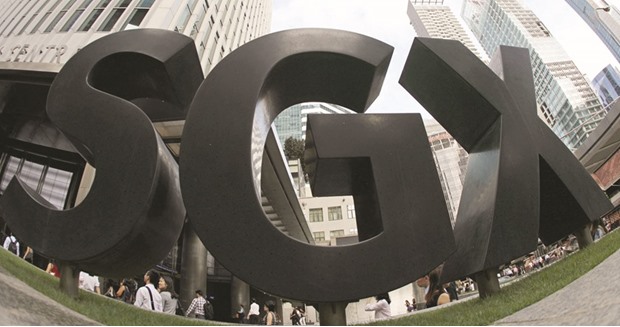Even as regulators crack down on yet another round of consolidation among exchange operators, at least one major bourse is still keen to pursue deals.
Singapore Exchange Ltd, which runs Southeast Asia’s largest stock and derivatives market, has in recent months held exploratory talks about possible tie-ups with overseas exchange operators, people familiar with the matter said.
Discussions with parties including Nasdaq Inc and CME Group Inc have ranged from potential collaborations to the sale of a stake in the company or even a full merger, the people said, asking not to be identified as the details aren’t public.
SGX, with a market value of about $6bn, has been weighing its options as rivals attempt to consolidate across the industry. An outright sale would be complicated as cross-border deals between exchange operators attract intense scrutiny from regulators, the people said. European Union regulators on Wednesday blocked Deutsche Boerse AG’s $14bn takeover of London Stock Exchange Group Plc, adding to a long history of failed merger attempts between bourses.
SGX has not hired any advisers and no formal decisions have been made about how to proceed, the people said. It’s unclear if any talks are currently active.
Representatives for CME, Nasdaq and SGX declined to comment. Shares of SGX closed down 0.13% yesterday.
Nasdaq, an exchange operator valued at $11.4bn, runs trading venues in the US, Europe and Canada. It is the third-largest stock exchange operator by volume in the $26tn US stock market.
Although regulators closely scrutinise cross-border mergers of exchanges, Nasdaq was able to buy Nordic exchange operator OMX in 2007.
Adena Friedman, Nasdaq chief executive officer, said on a panel discussion at an industry conference earlier this month that although cross-border exchange mergers come with additional scrutiny, they can ultimately benefit markets.
“When they do work, I think they can work really well,” Friedman said.
Partnering with or acquiring a stake in SGX would give a US or European exchange a stronger footing in Asia as the fight for global capital escalates. The company, based in Singapore with offices in mainland China, Hong Kong, India, London and Japan, reported net income of S$349mn ($250mn) in 2016, little changed from a year earlier, on total revenue of S$818mn.
The average daily value of shares traded on SGX this year was about $847mn, up 11% from $763mn in 2016, according to data compiled by Bloomberg. Still, that’s down from $1.12bn a day in 2013.
The Singapore bourse already has an existing relationship with New York-based Nasdaq. The US company sells technology to market operators in 50 countries, and SGX is one of its customers, according to regulatory filings.
In 2011, SGX’s A$8.35bn ($6.4bn) bid for Sydney-based ASX Ltd was scuttled by Australia’s government. The deal would have created the world’s fifth-largest bourse operator at that time.

A view of the Singapore Exchange signage outside its office in Singapore. SGX, with a market value of about $6bn, has been weighing its options as rivals attempt to consolidate across the industry. An outright sale would be complicated as cross-border deals between exchange operators attract intense scrutiny from regulators, sources said.
